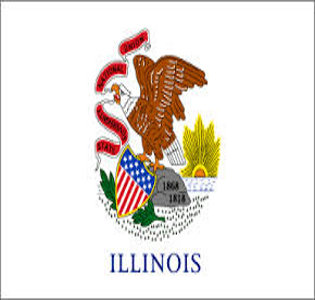
The Illinois General Assembly held a hearing on Wednesday regarding expansion of their gaming laws to include online poker, drawing out a heavy hitter from the Poker Players Alliance as well as a major opponent of such a move.
The Illinois Senate Executive Committee welcomed the PPA’s Executive Director, John Pappas, to their hearing, which covered a broad range of topics outside of online poker. Pappas, in his testimony in front of the Senators, emphasized several points where regulation overrode the logic of banning or not regulating the activity. “Establishing a regulatory regime for online poker and online gaming in Illinois will result in an open and competitive licensed market which would be attractive to both local riverboat licensees and worldwide operators,” Pappas stated in his opening remarks.
Pointing out the positives of regulation from a study by H2Gambling Capital (a noted gaming research firm), Pappas said that the state could bring in $197 million in its first year of regulatory action regarding online poker and that the second year would grow to $262 million. Those numbers would only get better if full online casino gaming was offered; the first year totals would amount to $508 million in revenues and, in the second year, would rise to $708 million.
“In order for Illinois to remain competitive, and quite frankly relevant, in gaming, the state must embrace the internet opportunities,” Pappas told the panel. “Now is the time for Illinois to act. Within the past year three states – Nevada, Delaware and New Jersey – have authorized and are regulating internet poker and internet gaming. Nearly a dozen more states are currently considering legislation. Today, Illinois and a handful of other states offer their lotteries over the internet. And, of course, for many years, Illinois horse bettors have been able to wager through the internet.”
Pappas did take time to address the concerns many elected officials have regarding the pitfalls of online gaming. By enacting stringent regulation, Pappas said that Illinois could combat underage and problem gambling through identity verification. He also noted that passage of online gaming regulations would deter the “criminal element” from online gaming by giving customers (online gaming participants) protection through the legal system. “Prohibition will only play into the hands of the criminal element,” Pappas said.
Supporting a ban regarding online gaming was the Executive Director of the Illinois Church Action on Alcohol & Addiction Problems, Anita Bedell. Ticking off a list of the evils of gambling overall and internet gaming in particular (the availability 24/7, the lack of significant controls), Bedell also noted that the Illinois gaming market might have reached its limits. “There are already enough opportunities for gambling in Illinois,” Bedell said regarding the saturation of the Illinois gaming market.
There was few questions from the legislators that were present at the meeting, but the major driver behind Illinois regulation of online gaming, Senate President John Cullerton, believes that he might be able to push through some sort of regulatory package before the end of the Illinois legislature’s spring session. With the state’s temporary income tax increase expiring this summer, Cullerton believes that online gaming would be able to replace part of those revenues. “The other states that are just getting started are bringing in some money, so that might play a role in when we try to pass a budget.”
Cullerton was forthright in some of the challenges online gaming regulatory passage would face. “There are a lot of complications about how it (online gaming regulation) affects the existing gaming industry,” he stated (that existing industry covers a handful of casinos and horse tracks in the state). “That seems to be where the hang up might be right now.”
Cullerton would also face stiff opposition from Illinois Governor Pat Quinn, who has been against an expansion of gaming in the Land of Lincoln. Previously, Quinn was against such an expansion due to the inability of the state legislature to pass pension reform, but he hasn’t embraced the idea of entering into the online gaming realm since passage of that pension reform last fall. During one of Cullerton’s previous attempts at passing an online gaming bill (which also included adding casinos in Chicago), Quinn said he vetoed the bill because of an “unsavory element” and that the regulations didn’t go far enough to prevent “organized crime” from entering the picture.























